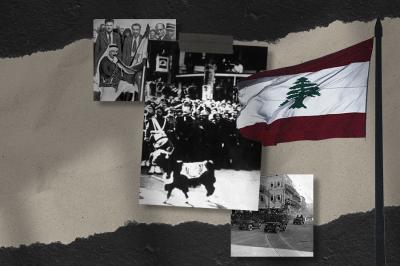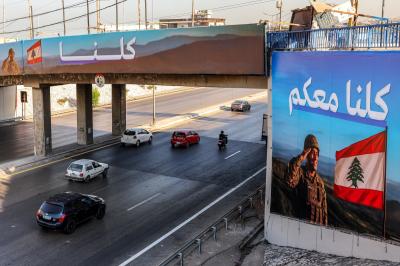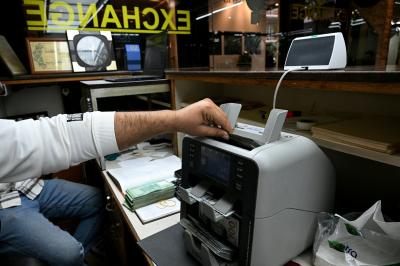Did U.S. envoy to the Middle East Morgan Ortagus throw Lebanon’s leaders a lifeline to pull them out of the well of accountability for the country’s economic collapse?
The question arises following her statement at the Qatar Economic Forum, where she revealed she had a “major plan” that could potentially allow Lebanon to bypass the International Monetary Fund (IMF). “Maybe, if we can turn Lebanon into a country attractive to investors, we can use their money here and spare the country from further debt,” she said.
Why turn to the IMF?
The frequent calls—sometimes sincere, other times sycophantic—for IMF intervention were never truly about a belief in the Fund’s miraculous powers. Many nations, near and far, have had disappointing experiences with the IMF. More often than not, countries end up agreeing to new programs just as the previous ones fail to resolve their crises. Whether it’s because the IMF’s rigid, checklist-style prescriptions ignore the social and economic complexities of individual states, or because those states are incapable of fulfilling such conditions, the Fund has often worsened problems rather than solving them.
The cautionary tales are many: Jordan, Morocco, Argentina, Egypt, Mexico… all caught in a cycle of debt with no clear way out.
Nor was the insistence on an IMF deal solely to secure the proposed $3 billion in budget and balance-of-payments support. Lebanon, after all, squandered four times that amount in less than two years through subsidies. Half of the Special Drawing Rights (SDR) it received were depleted in under a year. Over the past two years, Lebanon’s government even achieved a surplus exceeding $7 billion, accumulated in account No. 36 at the central bank—enough to cover the IMF’s proposed loan without adding to national debt.
Calls to involve the IMF were not about protecting depositors either, or recovering the estimated $160 billion in vanished savings. The Fund’s strategy to address the financial gap would erase at least 60% of bank deposits. Yet, if Lebanon could effectively utilize its assets—real estate, public institutions like the electricity and aviation sectors, entertainment facilities, and licensing opportunities—it could generate many times the stolen amounts in far less time. This would, however, require sound governance, dismantling monopolies, and opening markets to competition.
A former IMF director and president of the Lebanese Economic Association once conducted a study proposing a transformation of public assets into modernized, publicly listed companies. Such a move, he argued, could fully restore depositor funds and fuel economic growth and sustainable development.
Reform First
For some Lebanese citizens—particularly those outside the patronage networks—turning to the IMF was seen as a “last resort.” After years of failing to hold anyone accountable for the collapse, repatriate illicit transfers, deliver justice to depositors, or implement essential reforms in banking, public administration, and taxation, they viewed the IMF as the only external pressure capable of forcing change.
Until Ortagus’ statement, all indicators pointed to Lebanon’s continued financial isolation: no reconstruction aid following the Israeli war, no Egyptian gas or Jordanian electricity, no Iraqi oil, no significant social assistance—unless an IMF agreement was signed.
But that deal came with a long list of conditions: lifting banking secrecy, reforming and reorganizing the banking sector, distributing financial losses fairly, restructuring the entire public sector, creating regulatory bodies for aviation, energy, and telecom, completing appointments for public procurement oversight and the national anti-corruption commission, and implementing some 12 anti-corruption laws passed since 2008 but never activated.
Lebanon does have the resources to heal itself. What it lacks is trust that the ruling elite would carry out reforms that threaten their grip on the public sector and limit their ability to buy loyalty and secure political positions—unless forced by external pressure.
Bypassing the IMF?
Bypassing the IMF could also mean bypassing bank restructuring—and allowing corrupted financial institutions to escape accountability, closure, or even criminal liability. For many Lebanese, calling on the IMF was a way to block the usual Lebanese approach of sweeping the past under the rug—an approach that helped the country move on from the civil war, but left its root causes intact.
So far, the "lifeline" extended by Ortagus remains vague. Only the tip of the rope is visible, and it's unclear whether it will pull Lebanon out of the well or cut the line altogether. The terms of this supposed rescue plan—whether economic and reform-driven, or political and security-related—are still murky.
If it's the former, attracting foreign investment would still require the very reforms the IMF demanded: trustworthy banks, a functioning judiciary, reliable infrastructure (power, telecom, transport), and a fair tax system. Without these, investment would be neither sustainable nor long-term. In that case, Lebanon would shed the IMF in name only.
If it’s the latter—political compromises in exchange for short-term relief—the lifeline might turn into a pair of scissors. Just as Lebanon begins climbing out of the well, it could find the rope severed, sending the country—and its people—crashing back down.
Please post your comments on:
[email protected]
 Politics
Politics

